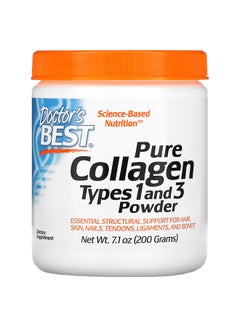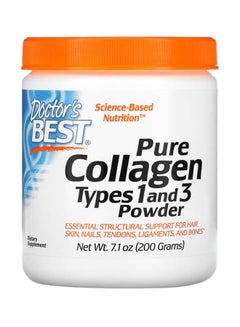64.00AED
69.00-
Lowest Price 47.86
-
Highest Price 89.00
-
Recent Price Drop -7.2%

64.00AED
69.00

|
Pure Collagen Types 1 And 3 Powder Dietary Supplement 7.1 Oz (200 G) |
72.90 AED
|
Buy Now | |

|
Collagen Types 1 And 3 Powder 7.1 oz (200 g) |
100.65 AED
|
Buy Now | |

|
Doctor's Best, Best Collagen, Types 1 & 3 With Peptan, 1,000 Mg, 180 Tablets |
80.71 AED
|
Buy Now | |

|
Doctor's Best, MSM Powder with OptiMSM, 8.8 oz 250 g |
66.81 AED |
Buy Now | |

|
Collagen Types 1 And 3 Dietary Supplement 500mg - 240 Capsules |
100.25 AED
|
Buy Now | |

|
Pure Vitamin C Powder With with Q-C 8.8 oz (250 g) |
123.85 AED
|
Buy Now | |

|
Pure L-Arginine Powder |
111.45 AED
|
Buy Now | |

|
Proteins Collagen Sports Greens Dietary Supplement - 150 Capsules |
298.00 AED
|
Buy Now |


*These statements have not been evaluated by the Food and Drug Administration. This product is not intended to diagnose, treat, cure, or prevent any disease.
Collagen is the major structural protein in healthy joints and the most abundant protein in the human body. It is mainly responsible for maintaining the strenght and flexibility of bones, joints, skin, tendons, ligaments, hair, nails, blood vessels and eyes, among other tissues throughout the body.
Doctor’s Best Collagen Types 1 & 3 Powder contains pure collagen protein, which contributes to the growth and maintenance of healthy tissues.* Taken as a supplement, this product provides the body with the raw material needed to support the strength and integrity of essential structures.* Collagen Types 1 & 3 Powder is enzymatically hydrolyzed into component peptides with a small molecular size for optimal absorption and utilization by the body.*
|
|
|
|
|---|---|---|
What are the benefits of Collagen Types 1&3?- Helps support healthy hair, skin, nails and joints* - Helps provide the building blocks for healthy tissues* |
Why take Collagen Types 1&3?- Collagen helps give our skin strength and elasticity, along with replacing dead skin cells.* - Our body's collagen begins to decrease as we age* Collagen is needed to mend connective tissue for strong muscles, skin and joints.* |
How does it work?- Types 1&3 collagen are often found together in the same tissues because each form complements the structural integrity of the other. - The research also suggests hydrolyzed collagen can stimulate the production of the major protein in cartilage (type II collagen) and of proteoglycans in the matrix of cartilage. |

Benefits:
Support for Hair, Skin, Nails, Tendons, Ligaments and Bones*
There are a number of different types of collagen, but the most prevalent two in the human body are types I & III. In fact, type I collagen is the most abundant protein in the human body, being present in almost every type of tissue.2 Bone contains almost exclusively type I collagen, its primary structural protein. Mineralization strengthens the collagen fiber network that makes up bone matrix.3 However, with age the ability of bone to target and repair microcracks is reduced, and furthermore, there is an age-related decrease in bone collagen content. It is important to maintain collagen production with aging in order to maintain structural strength of bone.4.
Type I collagen is the major protein found in skin connective tissue, providing it with its tensile strength and resiliency.5 Type III collagen is found prominently in cardiovascular tissue and newly developing skin, and is essential for the proper development of both. Types I & III collagen are often found together in the same tissues, as each form complements the structural integrity of the other. By providing types I & III collagen in a formula, Best Collagen provides certain amino acids that are building blocks for these types of collagen in the body—building blocks for the growth, maintenance, and integrity of collagen-rich tissues.
Vitamin C is required for the synthesis of collagen and participates at nearly every step of the process. The critical role of vitamin C involves preventing the inactivation of several key enzymes required for collagen biosynthesis. Cell studies suggest that vitamin C enhances the function of fibroblasts (cells capable of forming collagen) and promotes an increased level of collagen deposition by these cells in human tissue.6 Vitamin C also functions to promote the strengthening of the collagen matrix and supports an increased level of collagen density in organs and tissues. These effects of vitamin C also suggest that intake levels of this vitamin may be inadequate as we age. As oxidative stress in tissues increases with age, there is an increased requirement for this crucial antioxidant vitamin to promote optimal collagen production.
Collagen and Normal Aging:
Collagen synthesis is a continuous process throughout life. Rejuvenation and renewal of tissues throughout the body requires the production of newly synthesized collagen; however, this process can become less efficient as we age, leading to decreased renewal of old tissue. For example, in human tendons, collagen cross-linking is lessened with each passing decade.1 While age may internally impact the efficiency of organ and tissue function, the most apparent manifestation of this process occurs externally. The body’s most visible tissue—and thus the most obvious place to observe the effects of aging—is the skin. Levels of type I & III collagen, as well as elastin, decrease in the dermis with age, resulting in loss of elasticity.5 This contributes to the appearance of wrinkles, fine lines, and an aged look, in addition to various skin blemishes and discoloration. The rate at which this occurs depends upon many factors, including genetics, hormonal changes, and environmental exposures (such as UV radiation from the sun or tobacco smoking—both of which can lead to increased breakdown of collagen in the skin and/or decreased synthesis of new collagen).7, 8.
In conjunction with a nutritious diet, Best Collagen Types 1 & 3 provides amino acids to support rejuvenation of the body’s healthy structure as it ages and faces various daily stressors.
Support for Joint Comfort, Mobility, and Quality of Life*
Several recent joint health studies have been conducted in human populations using hydrolyzed collagen—the form of collagen in Best Collagen Types 1 & 3. This ingredient may support the structure and function of cartilage, since about 60% of the dry weight of cartilage is composed of collagen; hydrolyzed collagen is well absorbed and supplies amino acid building blocks specific to joint cartilage. This is in contrast to collagen supplied by foods, which has not been hydrolyzed and therefore is not as well absorbed. Prior to 2009, researchers reported that a daily intake of 10 grams of hydrolyzed collagen for 60 days or longer can promote joint comfort.9 This led to a randomized, double-blind, placebo-controlled multicenter study of 250 participants in 2009. In the study, 10 grams of powdered hydrolyzed collagen (or placebo) was taken each day for 6 months, and questionnaires were administered to assess changes in quality of life and joint comfort. Participants who took the hydrolyzed collagen and completed the study experienced superior joint comfort, and found it to be safe and well tolerated.9.
In a research trial of young, healthy, physically active individuals at Penn State University, similar results were seen. Of the 147 participants who enrolled in the study, data was analyzed for 97 participants who completed it. The results of this randomized, double-blind study indicated that participants who consumed 10 grams of hydrolyzed collagen daily for 24 weeks experienced greater joint comfort than participants who took placebo. Of the 4 adverse events in the study, none were considered related to the administration of hydrolyzed collagen.10.
A primary conclusion of this important study is that hydrolyzed collagen supplementation can potentially support joint health and comfort in the face of strenuous athletic activity. Preclinical research suggests that hydrolyzed collagen can pass intact into the body through the intestines and accumulate in cartilage tissue.10 The research also suggests hydrolyzed collagen can stimulate the production of the major protein in cartilage (type II collagen) and of proteoglycans in the matrix of cartilage.11, 12.
In a recent randomized, double-blind, controlled pilot study in which participants consumed either 10 grams of hydrolyzed collagen or placebo daily for 24 weeks, a new method of measuring proteoglycan concentration within hyaline (joint) cartilage was implemented. Using state of the art measurements, it was determined that hydrolyzed collagen was able to affect the structure of cartilage after 6 months of supplementation.13.
A study published in 2012 suggests that quantities much smaller than a 10-gram dose of hydrolyzed collagen can support joint comfort. In this randomized, double-blind, controlled trial of 200 men and women, 1200 mg of either hydrolyzed collagen or placebo was administered daily. After 6 months, the group receiving hydrolyzed collagen fared better on a joint comfort response scale.14.
References:
1. Sorensen Lt. Hernia. 2006; 10: 456-61.
2. Jensen Lt And Host Nb. Cardiovasc Res. 1997; 33: 535-9.
3. Bonjour Jp. J Am Coll Nutr. 2011; 30: 438S-48S.
4. Vashishth D. Curr Osteoporos Rep. 2007; 5: 62-6.
5. Callaghan Tm And Wilhelm KP. Int J Cosmet SCI. 2008; 30: 313-22.
6. Murad S, Grove D, Et Al. Proc Natl Acad Sci U S A. 1981; 78: 2879-82.
7. Chung JH, Seo Jy, Et AL. J Invest Dermatol. 2001; 117: 1218-24.
8. Yin L, Morita A, ET AL. Exp Dermatol. 2003; 12 SUPPL 2: 51-6.
9. Benito-Ruiz P, Camacho-Zambrano MM, ET AL. INT J Food SCI Nutr. 2009; 60 SUPPL 2: 99-113.
10. Oesser S, Adam M, ET AL. J NUTR. 1999; 129: 1891-5.
11. Oesser S And Seifert J. Cellular Tissue Research. 2003; 311: 393-399.
12. Clark KL, SebastianellI W, ET AL. Curr Med Res Opin. 2008; 24: 1485-96.
13. Mcalindon TE, Nuite M, ET AL. Osteoarthritis Cartilage. 2011; 19: 399-405.
14. Bruyere O, Zegels B, ET AL. Complement Ther Med. 2012; 20: 124-30.